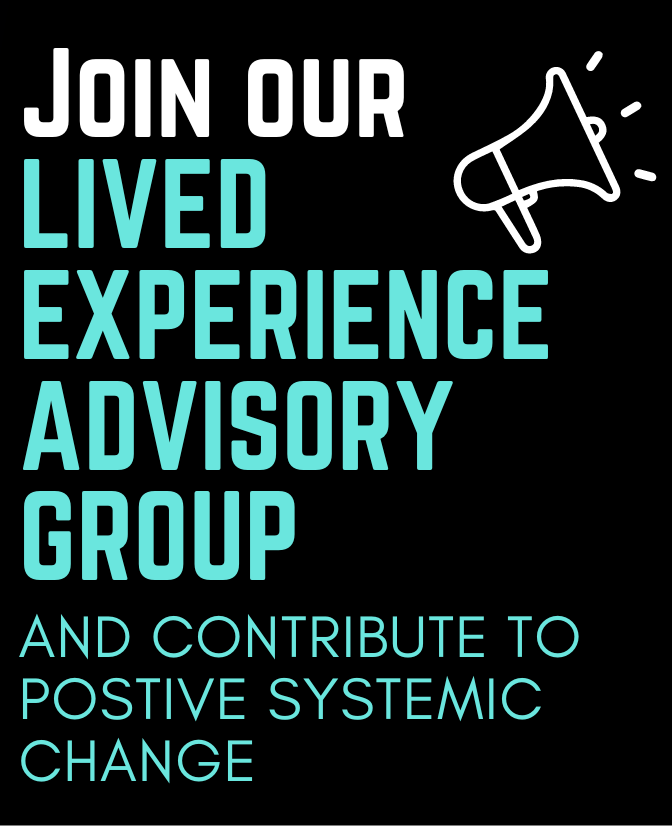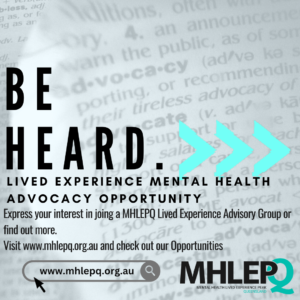Lived Experience Advisory Group - Coercive Practices Project
Expressions of Interest
MHLEPQ Values and commitments
The Mental Health Lived Experience Peak Queensland (MHLEPQ) is committed to meaningful engagement with people with a lived experience of mental health services, and as appropriate, other members of the community as equal partners in its work. The values that underpin our work are safety, respect, intentional, integrity and outcomes. We commit to[1]:
- interacting in a culturally and psychologically safe way
- working inclusively, compassionately, and patiently
- acknowledging mistakes, apologising and learning from them
- seeing the whole person in any interaction
- courageous curiosity about the strengths, resilience and capabilities of others
- interacting in a culturally and psychologically safe way
- working inclusively, compassionately, and patiently
- acknowledging mistakes, apologising and learning from them
- seeing the whole person in any interaction
- courageous curiosity about the strengths, resilience and capabilities of others
Restrictive Practices Project

Queensland Health (QH) have requested input by the MHLEPQ and lived experience representatives on the development of their Restrictive Practices Policy Statement. The use of restrictive practices in QH mental health alcohol and other drugs services is under review, with the intention of:
- describing QHs position on the use of restrictive practices
- aligning with the current national agenda and evidence base
- supporting services to reduce and where possible eliminate restrictive practices
- emphasising that restrictive practices involve involuntary treatment, containment (environmental restraint), seclusion, physical and mechanical restraint (chemical restraint is outside QH scope for their policy statement)
- guiding improvement strategies to enhance the safety of mental health alcohol and other drug services.
The information on this page can be downloaded as a PDF.
Who will be a good fit?
The MHLEPQ will appoint up to nine Lived Experience Advisory Group (LEAG) Members with a lived experience of mental ill-health who have relevant experience of restrictive practices as, focusing on inpatient care. The group will:
- represent First Nations Peoples
- represent a broad range of views that reflect the diversity of people, including people from a range of ages, ethnicities, genders, sexualities, metro and rural areas, and who identify as culturally and linguistically diverse
- have a commitment to improving the Queensland mental health system
- represent themselves as individuals, not service providers
- represent diverse communities’ experience of public and private mental health services that employ restrictive practice
Duties and Responsibilities
The LEAG advisory group will be guided by MHLEPQ policies and guidelines as they engage with the MHLEPQ staff, Board and stakeholders, as required, to:
- participate in discussions, activities, events, and training that relate to the stated objectives of the group, including:
- finalisation of the MHLEPQ Coercive Practices Position Statement; and
- contribution to the activities of Queensland Health’s Restrictive Practices Policy Statement development
- provide non-binding recommendations and/or key information to the MHLEPQ through the CEO or the Board, where specifically required to do so.
Paid participation policy[1]
Paid Participation is one of the ways MHLEPQ recognises the valuable, specialised and expert contribution made by people who have a lived/ living experience of mental ill-health. Members will be remunerated through:
- a Paid Participation Payment, based on the structure of the Queensland Mental Health Commission’s policy (Appendix 1)
- payment for reasonable travel and accommodation costs
- reimbursement of reasonable associated out of pocket expenses
Time spent traveling to and from, and preparing or reading for and after, Paid Participation activities will be included in the overall hours and will not be separately included in the payment claim.
What is being asked of this LEAG?
People with relevant lived experience of mental health inpatient care are being invited to inform the development of:
- Restrictive Practices Policy Statement for QH mental health alcohol and other drug services; and the
- MHLEPQ Coercive Practices Position Statement; and
- Emerging research collaborations with QMHC, University of Canberra and ARAFMI.
A MHLEPQ draft Coercive Practices Position Statement has been started, based on the organisation’s submission to the parliamentary mental health inquiry. This policy will be further shaped by the LEAG in collaboration with the MHLEPQ policy director and CEO, at the same time as engagement with Queensland Health for the purposes of their restrictive practices policy work.
Time/resource expectations
The LEAG will meet as often as required for the development of the project, which may be as frequently as weekly, but no less than quarterly. Each appointment lasts for a maximum of two years, or where the task is ongoing, for a maximum of four years.
Reporting
This group will be required to provide feedback as requested by the Board on MHLEPQ activities relating to the agreed priorities of the Restrictive Practices Project. The Members of this LEAG will report to the CEO (or nominee) and not to the Board directly.
Location
A hybrid way of working is generally established, with some face-to-face engagement expected at critical periods of project development. The address of the MHLEPQ office is WOTSO, 84 Brunswick Street, Fortitude Valley Brisbane. We also have access to Sunshine Coast offices. Travel to external stakeholder venues may occasionally be requested.
Our pledge to participants
Our awareness of the risks of participation
The main objective for our system advocacy body is one of cultural, psychological and organisational safety, underpinned by recovery-oriented, trauma-informed and culturally safe approaches. The MHLEPQ are intentional about caring for the wellbeing of all individuals and organisations they interact with. We acknowledge the potential for distress for people with lived experience of system-related harm within mental health services, including the possibility for traumatisation and re-traumatisation of people working with the MHLEPQ.
Cultural safety
The MHLEPQ are committed to organisational practices that are culturally safe, recovery-oriented, trauma-informed, and consumer-led. The concept of cultural safety will continue to evolve and be shaped by the interactions between the organisation, it’s members and the broader lived experience community, and remain one of our guiding principles. We are guided by the company’s Aboriginal and Torres Strait Islander Cultural Safety Policy, that states that “Culture can be constructed to relate to more than ethnicity alone. Culture can include a person’s socio-economic status or background, region, race, religion, gender, age, sexuality and / or (dis)ability”[2]. One previous LEAG found that cultural blindness is a major issue in mental health services and recommended a pivot toward a system that meets the cultural, social and safety needs of the people who use it.
Relationship building
We commit to develop and sustain a respectful organisational culture. We will seek to understand first, then be heard, as we develop collaborative relationships with the LEAG Members. The LEAG Members will be supported to build trust and rapport in several ways, including:
- opportunity at each meeting to get to know their peers in a relaxed way that creates safe and inclusive space, and an environment of participation
- information about safe storytelling and meeting practices
- discussions with individuals about their emotional readiness for personal story sharing and encouragement of “personal safety plans”
- a buddy system for communication about their wellbeing.
Inclusivity statement
The MHLEPQ are guided by their Diversity & Inclusion Policy that supports diversity along many dimensions. The policy states that “Our diversity encompasses differences in ethnicity, gender, language, age, sexual orientation, religion, socio-economic status, physical and mental ability, thinking styles, experience, and education”.[3] We are committed to tackling cultural stereotypes both within and outside our organisation, treating all people with respect and dignity, and benefitting consumer members through our diversity practices.
Support and debriefing
The Members will be provided mentor and administrative support arranged by MHLEPQ engagement leads and policy staff. Approaches to individual and group debriefing will be decided in collaboration with the members, with a range of internal and external options available.
Reflective learning
The MHLEPQ commit to reflecting on the LEAG project journey by documenting the feedback, experiences and recommendations of the Members during, and at the completion of their work. We will evaluate and share the views from the codesign debrief process and take new learnings forward in our work.
Approaching Conflict
Tensions naturally arise due to differences of opinion and are welcomed as an expected part of the co-creative process. We believe that open and respectful communication in the context of conflict transformation principles that focus on building constructive change out of conflict, are often sufficient to support positive outcomes. Formal dispute resolution processes are outlined in the MHLEPQ Constitution and detailed more in the Company Operations Manual. These documents are available to LEAG Members, as well as a designated person to discuss conflict with in the first instance

Ready to express your interest?
Let us know by filling out the Expression of Interest Form.
To open the form in a new browser tab, click the Expression of Interest Form button or use express your interest by completing the form below.
